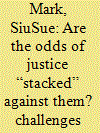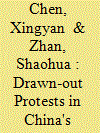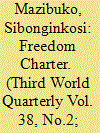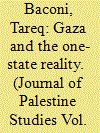|
|
|
Sort Order |
|
|
|
Items / Page
|
|
|
|
|
|
|
| Srl | Item |
| 1 |
ID:
146639


|
|
|
|
|
| Summary/Abstract |
In 2012, the Government of Myanmar passed the Farmland Law and the Vacant, Fallow, Virgin Land Law, with an aim to increase investment in land through the formalization of a land market. Land titling is often considered “the natural end point of land rights formalization.”1 A major obstacle to achieving this in Myanmar is its legacy of multiple regimes which has created “stacked laws.”2 This term refers to a situation in which a country has multiple layers of laws that exist simultaneously, leading to conflicts and contradictions in the legal system. This ambiguity is often manipulated by those who have more access to political and economic resources, particularly those who received large land concessions under the 1988–2010 military regime. In this context, this paper attempts to answer the question: In Myanmar, how do smallholder farmers engage with a stacked legal framework, which is ambiguous and unfairly applied, to defend themselves against land dispossession? The analysis seeks to contribute to the literature on the contest over land control and access through an analysis of how a stacked legal framework can be used to further disenfranchise farmers by elites, or on the contrary, by farmers to gradually reclaim this control through strategic political
|
|
|
|
|
|
|
|
|
|
|
|
|
|
|
|
| 2 |
ID:
189503


|
|
|
|
|
| Summary/Abstract |
The rise of the land revenue regime in China, characterized by land dispossession in the countryside and land redevelopment in the city, has sparked numerous protests. This study draws attention to the paradox that the regime has helped to mitigate labour unrest, at least temporarily, in China's Rustbelt, where millions of workers were laid-off in the 1990s. Based on field research in Anshan, Liaoning province, and data from other cities in the Rustbelt, this article shows that laid-off workers’ protests persisted much longer than previously thought, largely owing to a lack of local fiscal resources to meet workers’ demands. Only with the growing revenue from land sales in the recent decade has the local government finally been able to ease the tension with laid-off workers. The article argues that bargained authoritarianism, or “buying stability,” widely considered to be an effective strategy by the local state to control social unrest, has its limits, mainly owing to its dependence on local fiscal resources. Recent economic downturns and declining land revenue will disrupt this strategy, leading to protracted protests and struggles in future.
|
|
|
|
|
|
|
|
|
|
|
|
|
|
|
|
| 3 |
ID:
151505


|
|
|
|
|
| Summary/Abstract |
The Freedom Charter represents a desire to create a society that is based on common citizenship and democracy in a society divided in all aspects of its life. This paper problematises and interrogates the Charter’s theoretical and philosophical claim on land. It uses the methodology of Afrocentricity and Africana critical theory to dispute the theoretical and philosophical basis of the Freedom Charter. The paper argues that the understanding, desire and vision of the Freedom Charter are irreconcilable. It concludes that the Charter reconciles the dispossessed with their dispossession, reflecting coloniality and white domination in South Africa.
|
|
|
|
|
|
|
|
|
|
|
|
|
|
|
|
| 4 |
ID:
178333


|
|
|
|
|
| Summary/Abstract |
In contemporary conversations around Israel/Palestine, the Gaza Strip is construed as a state of exception, rendering the territory either hypervisible or entirely invisible. Through the prism of the Covid-19 pandemic and Israel’s possible de jure annexation of portions of the West Bank, this piece argues that rather than being exceptional, the Gaza Strip represents the very embodiment of Israeli settler colonialism in Palestine. Its isolation and de-development constitute the endpoint of Israel’s policies of land theft and Palestinian dispossession. This endpoint, referred to as Gazafication, entails the confinement of Palestinians to urban enclaves entirely surrounded by Israel or Israeli-controlled territory. The Trump plan, otherwise known as the “deal of the century,” along with the Covid-19 crisis, have inadvertently exposed the reality of Gaza as an enclave of the one-state paradigm.
|
|
|
|
|
|
|
|
|
|
|
|
|
|
|
|
|
|
|
|
|